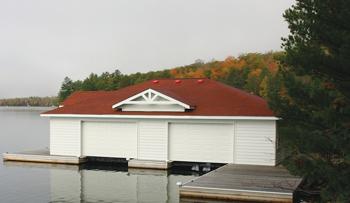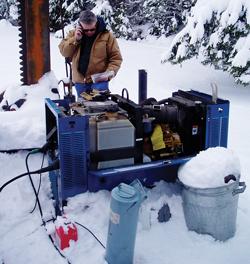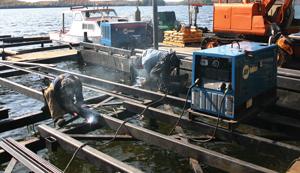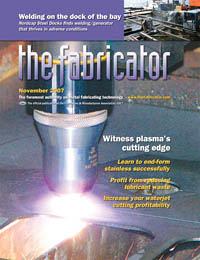- FMA
- The Fabricator
- FABTECH
- Canadian Metalworking
Categories
- Additive Manufacturing
- Aluminum Welding
- Arc Welding
- Assembly and Joining
- Automation and Robotics
- Bending and Forming
- Consumables
- Cutting and Weld Prep
- Electric Vehicles
- En Español
- Finishing
- Hydroforming
- Laser Cutting
- Laser Welding
- Machining
- Manufacturing Software
- Materials Handling
- Metals/Materials
- Oxyfuel Cutting
- Plasma Cutting
- Power Tools
- Punching and Other Holemaking
- Roll Forming
- Safety
- Sawing
- Shearing
- Shop Management
- Testing and Measuring
- Tube and Pipe Fabrication
- Tube and Pipe Production
- Waterjet Cutting
Industry Directory
Webcasts
Podcasts
FAB 40
Advertise
Subscribe
Account Login
Search
Holding up under 'pier' pressure
Metal pier manufacturer banks on durability, service to stay afloat
- November 6, 2007
- Article
- Arc Welding

Nordcap began using steel to build its docks because the steel lasts longer than wood and it creates a minimal footprint on the bottom of the lake.
The Lake of Bays and Muskoka Lake in Ontario, Canada, offer the perfect escape for those who wish to trade in the chaos of city life for the beauty and serenity of Canada's great outdoors. However, while the residents sleep in, the crew of Nordcap Steel Docks are already hard at work to meet the ongoing demand for steel docks. In fact, the demand is so great that the Nordcap crew works year-round, taking off only a week or two in the dead of winter and a few other days when the weather forces them inside.
When the lakes freeze over, Nordcap employees bring their supplies in on sleds. At other times they work from one of their barges—portable shops that carry everything they need to complete a job. A few things can stop them: waves that crest over the dock, howling winds, ice, temperatures below -25 degrees F, and equipment that breaks down or won't start.
The Nordcap crew can't do much about the weather, of course, but if their equipment breaks down, it can cost up to $200 an hour in lost labor—more than that if they've rented additional equipment. Plus, even a single lost day can throw off weeks of scheduling.
Taking the Plunge
When Philipp Spoerndli, Nordcap president, started in the business, he built and repaired wooden docks, which were on cribs, wooden structures that take up a large footprint on the lake bottom. Over time the wooden structures would settle in or deteriorate.
"Fixing them was a tough job," Spoerndli recalled. "You'd have to lift the boat houses and remove the rocks from the crib. After a while I said to myself, 'There has to be a better way,' and I turned to steel docks in 1991."
At that time steel docks were a fad; now they've become the preferred choice of many. In contrast to wooden docks, steel docks have less of an environmental impact because they create a minimal footprint on the lake bottom and use steel instead of wood. Plus, they last longer than wooden docks—two to three times longer—according to Spoerndli, who uses the heaviest-wall steel pile he can while still remaining competitively priced.
Spoerndli and the Nordcap crew distinguish themselves from their competitors in other ways too. They sandblast and epoxy-coat all steel used on the docks. They also use sacrificial anodes to inhibit corrosion and increase longevity and drive the piles all the way down to the bedrock to prevent settling. A Nordcap dock can be expected to last 75 or 85 years before needing maintenance, compared to about 25 years for a wooden dock.
Carpenters out, Welders In
As wooden docks gave way to steel ones, welders took up the work previously performed by carpenters. When Spoerndli began working with steel docks, he hired knowledgeable welders and took classes to become a Canadian Welding Bureau-certified (CWB-) supervisor. He now has two all-position, CWB-certified welders on his crew, one welder certified in flat and horizontal positions, and a second CWB-certified supervisor.
Initially Spoerndli and his crew worked from a raft and rented a barge to do the pile driving. He later bought the barge, which they now use as a floating workstation and to transport tools and equipment on the lake. They've also made a switch to Miller welding equipment: two Miller PRO 300 diesel welder/generators and two Maxstar 200 SMAW/GTAW welders. The switch to Miller equipment came two years ago while Nordcap was working on the Muskoka wharf with a different equipment brand. The oil cap suddenly blew off of a welder/generator and filled the air with white smoke.
"We got it working again, but I was really dissatisfied with the service we received from our distributor at the time," Spoerndli said. "If we hadn't been able to get it going, we would have really been stuck. I had rented equipment that was costing $500 an hour, labor costs of $200 an hour, and I couldn't afford to have any downtime. I never wanted to be in that situation again."
After that experience, Spoerndli turned to Praxair.
To solve Spoerndli's equipment issues, Dave Middlebrook of Miller and Roger Barton of Praxair recommended the low-speed, multiprocess diesel welder/ generator. Capable of SMAW, GTAW, GMAW, FCAW, and air carbon arc gouging, the unit has low noise output (73 dBA at 23 feet at maximum output), which is an important consideration for a company that works year-round in a location where people come to enjoy the scenery and relax.
"You have to appreciate where we work," said Edward McNaughton, a Nordcap CWB-certified welder, indicating the beautiful scenery. "Customers here are very particular about noise levels, but we can run a PRO 300 at 7 a.m. without any noise complaints."
But Spoerndli's appreciation goes beyond the welding unit's low noise. Because of its light weight and compact size (1,100 pounds with a 26-inch by 56-in. footprint), the company can easily fit two on its barge. Plus, the unit has all the welding power the crew needs for the 3⁄8-in. steel they work with.
"The penetration is great," said McNaughton. "We can strike an arc right through the paint without prepping the metal, if necessary. The machine is easy to dial in. About 60 percent of a good weld is having the right equipment. The rest is skill."
But there were some unexpected benefits to the welding system that make Nordcap's life easier. Spoerndli also bought a gas-powered unit for those cold days when it would be difficult to start a diesel engine. But through the winter they never had to use the gas engine drive, which would have been less economical than the diesel model.
"We were out here year-round, in all conditions, and the PRO 300 started every time," McNaughton said. "If there's fuel and oil in it, it's a done deal—we're going to work. That's a really big thing. A breakdown would cause major headaches. First of all, it would put us behind on the next project. Since we're committed to so many projects a year, a machine that doesn't run means we have to work overtime on Saturdays and nobody wants to do that. Second, you don't want to have a crew standing around at $200 an hour while someone tries to start the machine."
Being able to use the diesel power unit year-round saves on fuel prices too. Since Nordcap needs to add only about 5 gallons a shift and uses off-road diesel (priced lower than automotive), which costs about $0.78 Canadian a liter, the company can run the welding machine for less than $14 Canadian per day.
Two Arcs, One Welder/Generator
There was another unexpected benefit. With 10,000-W (12,000-W peak) generator power, the unit has enough power to run grinders, chop saws, microwaves, and a Miller Maxstar 200 SMAW/GTAW unit that allows the company to get two arcs from one machine, cutting fuel use in half and saving room on the barge.
The Maxstar 200 is a 37-lb., inverter-based power source that provides 150 amps at 26 volts (60 percent duty cycle); draws 5 kilowatts maximum and, by incorporating Auto-Line™ technology, can run off any 115-V to 460-VAC power supply, single- or three-phase, and keep the output constant regardless of fluctuations in power of ± 10 percent.
Finding a Level of Comfort
While the welding machine has answered many of Norcap's needs, it is not perfect. For instance, it doesn't float.
"The PRO 300s are great machines as long as we don't submerge them," said Spoerndli, referring to the time the boat was swamped and the welding unit sank.
No one was sure if the machine was salvageable—submerging it isn't a factory-recommended procedure. However, the welding unit is protected by The Vault, which houses the control board in a hardened, watertight case, and a marine-grade ignition switch, which is sealed and protected for water and dust.
Spoerndli was advised that the machine would need to be scrapped, but Jack Lowe at Northern Machine in Barrie, Ont., dried it out and got it back in working order.
With the switch to Miller equipment came the level of comfort Spoerndli had hoped for, both in the equipment and the service. Now he just has to worry about the weather.
subscribe now

The Fabricator is North America's leading magazine for the metal forming and fabricating industry. The magazine delivers the news, technical articles, and case histories that enable fabricators to do their jobs more efficiently. The Fabricator has served the industry since 1970.
start your free subscription- Stay connected from anywhere

Easily access valuable industry resources now with full access to the digital edition of The Fabricator.

Easily access valuable industry resources now with full access to the digital edition of The Welder.

Easily access valuable industry resources now with full access to the digital edition of The Tube and Pipe Journal.
- Podcasting
- Podcast:
- The Fabricator Podcast
- Published:
- 04/16/2024
- Running Time:
- 63:29
In this episode of The Fabricator Podcast, Caleb Chamberlain, co-founder and CEO of OSH Cut, discusses his company’s...
- Industry Events
16th Annual Safety Conference
- April 30 - May 1, 2024
- Elgin,
Pipe and Tube Conference
- May 21 - 22, 2024
- Omaha, NE
World-Class Roll Forming Workshop
- June 5 - 6, 2024
- Louisville, KY
Advanced Laser Application Workshop
- June 25 - 27, 2024
- Novi, MI

































